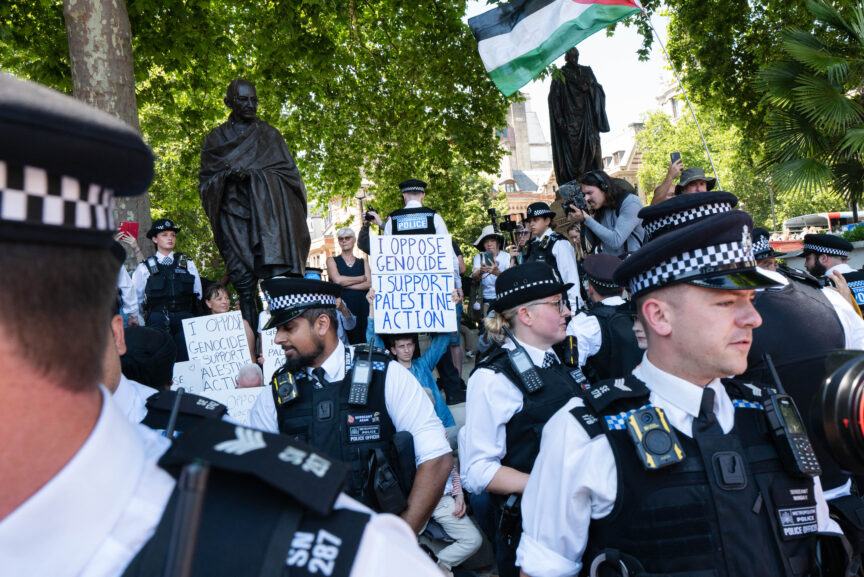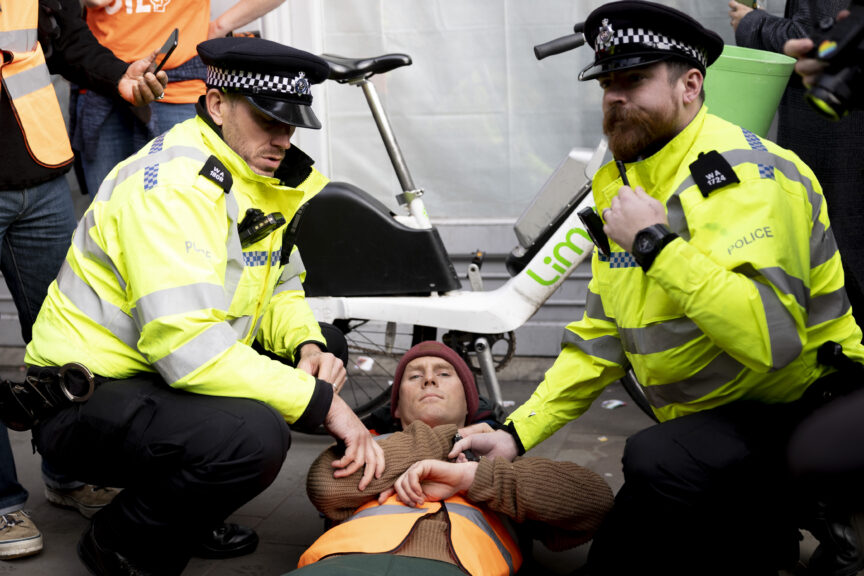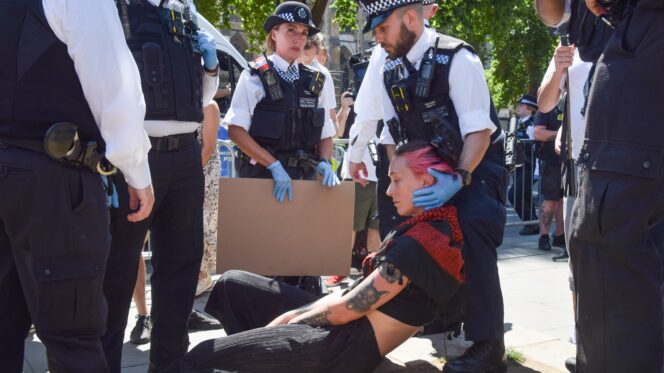The Government Has Been Expanding the Definition of Terrorism for Years. Here’s How

The government’s proscription of Palestine Action earlier this month was widely seen as a dramatic break with history: never before had the UK banned a non-violent direct action group for being a terrorist organisation.
Palestine Action now sits on a list alongside 81 organisations that include Isis, al-Qaida and the neo-Nazi Sonnenkrieg Division. But while the group’s proscription has been described by Amnesty as “unprecedented legal overreach”, it is also the logical endpoint of decades-long expansion of UK counter-terror legislation.
Ever since the first counter-terror laws were passed half a century ago, governments have taken an additive approach to counter-terror, targeting real, perceived and, at times, entirely hallucinated threats to the British public with increasingly – and by its own admission – draconian legislation.
Whack-a-mole.
“The so-called terrorism problem … was of course originally the Irish problem,” writes law professor Conor Gearty – more specifically, the problem of the colonies. While the concept of terrorism is over 200 years old, originating in the “reign of terror” of the French revolutionary government, Gearty traces the roots of UK counter-terrorism to the attempt to contain rebellions against British imperial rule, specifically in India and Ireland.
In response to growing Indian nationalism in the Raj, Westminster passed the Anarchical and Revolutionary Crimes Act of 1919, which gave the British forces the power to arrest Indians without charge, and to detain them without trial for up to two years. A year later, parliament effectively copied and pasted the legislation into the Restoration of Order in Ireland Act, in response to Irish republican insurgency.
The UK’s counter-terror drive did not begin in earnest, however, until the 1970s, following IRA bombings in Northern Ireland and England. The Prevention of Terrorism Act 1974 gave the government the power to detain people for up to a week without a warrant; to stop people travelling between Northern Ireland and Britain with no right to remain silent or to a lawyer; and to bar anyone from entering Britain on suspicion of terrorism. According to human rights group Liberty, by the late 1990s, the UK had detained over 7,000 people under the act, the majority of them later released without charge. The act also created a list of proscribed organisations – at the time just the IRA – of which membership was forbidden.
The home secretary at the time, Labour’s Roy Jenkins, admitted to parliament that the powers created by the Prevention of Terrorism Act “are draconian” and “unprecedented in peacetime”, but said it was “impossible to respond to … the present unprecedented situation without draconian powers”. Jenkins pledged to review the act after six months; it remained in place for 26 years.
Counter-terror law in the UK, as in most of the rest of the world, is largely developed reactively in response to specific incidents. Lee Jarvis is a professor of international politics at Loughborough University and co-edits the journal Critical Studies on Terrorism. He told Novara Media: “An atrocity would happen, and the British government would introduce a law to try and respond to that, to prevent it [from happening again]. And then those powers, introduced on a temporary basis, would become institutionalised.”
The Anti-Terrorism, Crime and Security Act (ATCSA) is a prime example of this. Labour passed the act just three months after the 9/11 bombings in New York in 2001. The act’s main innovation was the indefinite detention of foreign terrorist suspects – a provision intended to expire in 2006, but instead made permanent in the watered-down form of non-custodial “control orders” in the Prevention of Terrorism Act 2006.
Reckless speech.
Like its police powers generally, the UK tested them on the colonies before bringing them home to the imperial core. The government gave up the pretence that its counter-terror legislation was intended to be temporary with the Terrorism Act 2000, the legislation that underpins most counter-terrorism policing in the UK today. The act did away with the tradition that counter-terror legislation would be subject to annual review and five-yearly re-enactment.
The act also significantly expanded what constituted supporting a proscribed group to include not only material support, but speech acts in support of a group. While its original wording criminalised only membership, funding or assistance of a proscribed organisation, hearing from members of one, or wearing clothes that aroused suspicion of membership, a 2019 amendment to the act expanded the definition of “support” to include “expressing an opinion or belief that is supportive of a proscribed organisation”. Such support had to be expressed in a manner “reckless as to whether a person to whom the expression is directed will be encouraged to support a proscribed organisation” – a provision vague enough to encompass even the mildest expressions of sympathy.
For such a sentiment to fall foul of the act, it doesn’t even need “an intention that your listener or listeners should agree”, the government’s former independent reviewer of terrorism legislation, Lord David Anderson KC, told the Lords earlier this month in a debate on the proscription of Palestine Action. “So by bringing Palestine Action, for example, within the ambit of the terrorism laws, anyone who is young and foolish enough to say that their heart is in the right place, or that the government should listen to them, is committing a very serious offence for which they could be prosecuted, convicted and imprisoned as a terrorist.”
The 2006 Terrorism Act went even further in associating speech acts with terrorism. The law made it a potential terrorist offence to “glorify” terrorism, including praising terrorist acts. Then-Labour MP Jeremy Corbyn called the glorification provision “absurd” and “misguided”, saying it would “end up entrapping the innocent and preventing legitimate debate”. Corbyn’s warning sounds prescient today, after hundreds of people have been arrested for holding signs that read “I oppose genocide, I support Palestine Action”.

Property or people.
There is no internationally agreed-upon definition of terrorism. This is for good reason, says Professor Jarvis. “It suits the interests of political actors to have ambiguity, because it’s such a powerful way of condemning one’s enemies that ambiguities can be politically productive.” He cites the United States, where Donald Trump has recently added eight drug cartels to the country’s list of foreign terrorist organisations.
The UK has kept its definition of terrorism similarly amorphous and flexible. The 1974 Prevention of Terrorism Act defined terrorism only in passing, as “the use of violence for political ends, and includes any use of violence for the purpose of putting the public or any section of the public in fear”. The 2000 Terrorism Act laid out a fuller – though according to some, too full – definition. The act characterised terrorism as an act that involves serious violence against a person; serious damage to property; danger to a person’s life; a serious risk to the public; or serious disruption of an electronic system. The inclusion of property damage in this definition has been a source of controversy ever since.
The definition has been criticised – including by the government’s own terrorism law reviewer Lord Anderson – as “over-broad”, and as therefore having the potential to ensnare non-violent actors: “The UK legal definition of terrorism doesn’t have to include violence, which opens it to potential application against groups that most of us would instinctively think are not terrorists,” Lord Anderson says. In its 1999 report on the then Terrorism bill, Liberty called it “surprising” to find no definition of violence. Citing public order legislation, the group added that “usually damage to property is described in statutes as criminal damage and not as ‘violence’”.
Efforts have been made at an international level to exclude mere property damage from the definition of terrorism. In 2004, the UN passed a resolution expressly stating that terrorism should include harm to people. The UK voted for it. A few years earlier, the government was insisting that it would be selective in its application of terror legislation – and pledged specifically that it would not target activists.
Debating the soon-to-be Terrorism Act in 1999, MPs questioned whether terroristic property damage would include that committed by protesters. Giving the example of animal liberation activism, much of which involved damaging animal testing facilities, then-home secretary Jack Straw said that “we are not talking about demonstrations that get out of hand”. Straw told another concerned MP that those supporting international human rights campaigns, such as those of the Kurds or indigenous Americans, “will not even remotely come under the bill”.
“To think that the bill will restrict the right of peaceful protest, demonstration and campaigning is wholly erroneous”, Straw said.
Yet with the proscription of Palestine Action, Straw’s critics may have been vindicated. Many have argued that Palestine Action itself has not used violence towards people as a core tactic, focusing on property damage to achieve its ends. (One Palestine Action activist, Simon Corner, was charged with grievous bodily harm with intent for allegedly striking a police officer with a sledgehammer while blockading a weapons factory in Bristol. He denies the charges.)
“The criminal law in England and Wales clearly distinguishes between acts which amount to violence against the person – which carry significantly more serious sentences and forms of punishment – and acts of violence which amount to criminal damage and destruction of property,” writes criminal barrister Nour Haidar. “This would seem to reflect a moral distinction between actions which cause harm to other humans and actions which cause harm to property.”
“The home secretary’s use of terrorism legislation to control the ways in which Palestine Action expresses dissent to an ongoing war is an attempt to collapse that distinction.”
Professor Jarvis shares this concern. “I think Palestine Action’s proscription is a stretching of the sorts of organisation that are brought into the remit of [counter-terrorism] powers … because of its lack of direct violence. … Will this open the door to other direct action groups, protest groups or advocacy groups being proscribed? We’ll find out, I suppose. But that’s the risk.”
Civil liberties for Nazis.
Mirroring the expansion of counter-terror legislation has been the growing list of proscribed organisations, now a bloated 96, including 82 in the UK and 14 specifically in Northern Ireland (Professor Jarvis notes the consensus within a normally pro-security counter-terror academia on the complete inefficacy of proscription as a tool). For many years, the IRA was the only group on the proscribed list. During the so-called war on terror, the authorities began to add Islamist organisations to the list – then, in the 2010s, far-right groups.
Yet while many progressives were encouraged by this latter development at the time, experts say that it enabled the broadening of counter-terror legislation to entrap the left.
In 2016, National Action became the first far-right group to be proscribed in the UK, after posting “Only 649 MPs to go” after Thomas Mair’s murder of Labour MP Jo Cox (one member described Mair as a “hero”). Several other neo-Nazi groups soon followed.
According to Alan Jones, a researcher for anti-fascist research group Red Flare, the proscription of far-right groups has laid the groundwork for the government’s use of counter-terror powers against the left, by “presenting these very authoritarian, draconian powers with a liberal veneer”.
“It’s very difficult to make a civil liberties argument for National Action,” says Jones, since their overt neo-Nazism was “lurid, antisemitic, racist and proudly so”. Once National Action had been proscribed, however, this “opened out the possibility for proliferation of these powers and a wider targeting.”
“Look at where we have ended up. We’ve seen it expanded very quickly, going from groups like National Action through to Palestine Action being proscribed.”
The government has taken advantage of this difficulty of making civil liberties defences for neo-Nazis in the proscription of Palestine Action. In her proscription order, home secretary Yvette Cooper deliberately placed Palestine Action alongside two far-right groups, the Maniacs Murder Cult and the Russian Imperial Movement, making the bill difficult to oppose (Jeremy Corbyn asked that MPs be allowed to vote on the groups individually, but was dismissed). Cooper’s attempt to conflate a non-violent direct action group with violent neo-Nazis was “really obvious”, says Jones.
The other flipside of proscribing far-right groups, adds Jones, is that it allows the government to project its own racism onto outside groups. “The British state would like to be seen as an almost apolitical manager of society, making neutral judgements over what’s acceptable and what isn’t acceptable,” says Jones. “Passing blame onto these very extreme groups allows the government to carry on with anti-migrant policies and sentiments which are inevitably stoking far-right movements in this country.”
Eco-terrorists.
While the definition of terrorism is blurry, in recent years counter extremism experts have been pushing to further muddy the waters by inventing new categories for political groups – mostly environmental – which could not be labelled terrorists.
The term “eco-terrorist” has been used by UK politicians since the 1990s. Ironically, it was first used to describe the actions of climate polluters, such as those responsible for the Gulf war oil spill of 1991. Only later was its meaning inverted to describe those protesting such environmental recklessness.
“We legislate because we are put under great pressure by a new group of what I call eco-terrorists, who seek to press their opinions on politicians,” Tory MP Teresa Gorman told the Commons, criticising the government’s planned intention to introduce environmental protection legislation. “Many of them are ex-socialists and their green wellies have red linings.”
In 2010, these green-wellied eco-terrorists were named explicitly in Ministry of Justice guidance, which listed “environmental extremists” alongside loyalist paramilitaries, Irish republicans, al-Qaida and far-right groups (the expansion of the definition of extremism has also targeted the far right: in 2021, the government’s Commission for Countering Extremism released a report recommending a new category of “hateful extremism” to fill a perceived gap in the law between hate crimes and terrorist acts, focusing on far-right groups). In 2023, former defence secretary Grant Shapps wrote in the Daily Mail that Just Stop Oil were “eco-extremists”.
In 2024, Lord Walney, the government’s discredited former advisor on political violence, recommended that the government go even further in its crusade against leftwing activists via the creation of a new category, “extreme protest groups”, into which groups such as Just Stop Oil and Palestine Action would fall. Shortly before the Palestine Action ban, Met commissioner Sir Mark Rowley used a variation of Lord Walney’s term, dubbing PA an “organised extremist criminal group”.

While the ban on Palestine Action is in many ways novel, it is also part of a years-long use of counter-terror policy against activist groups, most of them on the left. A major aspect of this has been the use of the Prevent duty, the government’s counter-extremism programme introduced in 2014 and a pillar of its war on terror.
In 2023, it was revealed that between 2015 and 2022, there had been 32 referrals to Prevent for “leftwing – environmental” reasons. The reports prompted widespread criticism, and not only from the usual suspects: Sir Peter Fahy, a former national police lead for Prevent, said in response to the reports that it was “inappropriate” to treat non-violent climate activists as potential terrorists.
Dr Layla Aitlhadj is the director of Prevent Watch, an initiative that monitors the impact of the Prevent duty. Speaking to Novara Media, she says: “The proscription of Palestine Action will lead to an increase in people being referred to Prevent simply for voicing concern about the genocide in Gaza.”
In fact, she adds, “this is already happening”, noting a rise in Prevent referrals over the last two years targeting those who express support for Palestine. In December, it was reported that “Islamist” referrals to Prevent increased by 45% after the Hamas attack on 7 October 2023.
“This isn’t a new phenomenon. Prevent has a long history of targeting individuals supportive of Palestine. The impact of referrals following the proscription of Palestine Action will be hard to ascertain and it’s not something that will play out immediately,” says Dr Aitlhadj. “It could take months or even years to see the full consequences.”
Under what power?
Prevent is a reminder that, while proscription is arguably the most extreme counter-terror lever available to the government, it has others, too, and has long used them against leftwing groups – including Palestine Action.
The government has used counter-terror powers against Palestine Action prisoners, including those not charged with any terror offences. Several of the Filton 18 – a group of Palestine Actionists accused of participating in a protest at an Israeli weapons factory in Bristol last August – have been held for long past the recommended limits without trial, and denied privileges in a manner consistent with terror suspects, with the Home Office citing supposed “evidence … that these offences have a terrorism connection”.
In response to the Filton 18’s treatment, four UN experts wrote to the UK government expressing concern that the police “exercised significant powers under counter-terrorism legislation despite the absence of a credible connection between the activists’ conduct to terrorism”, adding that counter-terrorism legislation “may have been used to circumvent procedural safeguards in relation to detention”. Following the UN letter, a group of more than 20 international legal groups wrote an open letter describing the use of counter-terror procedures to detain the Filton 18 as “a serious breach of human rights standards signalling backsliding of the rule of law.”
A further group of UN rapporteurs wrote to the government shortly before the proscription of Palestine Action, expressing their concerns that the UK was weaponising terrorism law against protesters.
Palestine Action’s proscription has shocked the liberal establishment, much of which has suspended its usual disdain for the Palestine movement to oppose the ban as an intolerable expansion of state power. Yet anyone who is surprised by proscription hasn’t been paying attention. In its banning of Palestine Action, the government’s gradually expanding counter-terror drive has reached its predictably illiberal apotheosis: the designation of an anti-genocide direct action group, and 83-year-old priests who express support for them, as terrorists.
Rivkah Brown is a Novara Media commissioning editor and reporter.
Simon Childs is a commissioning editor and reporter for Novara Media.


